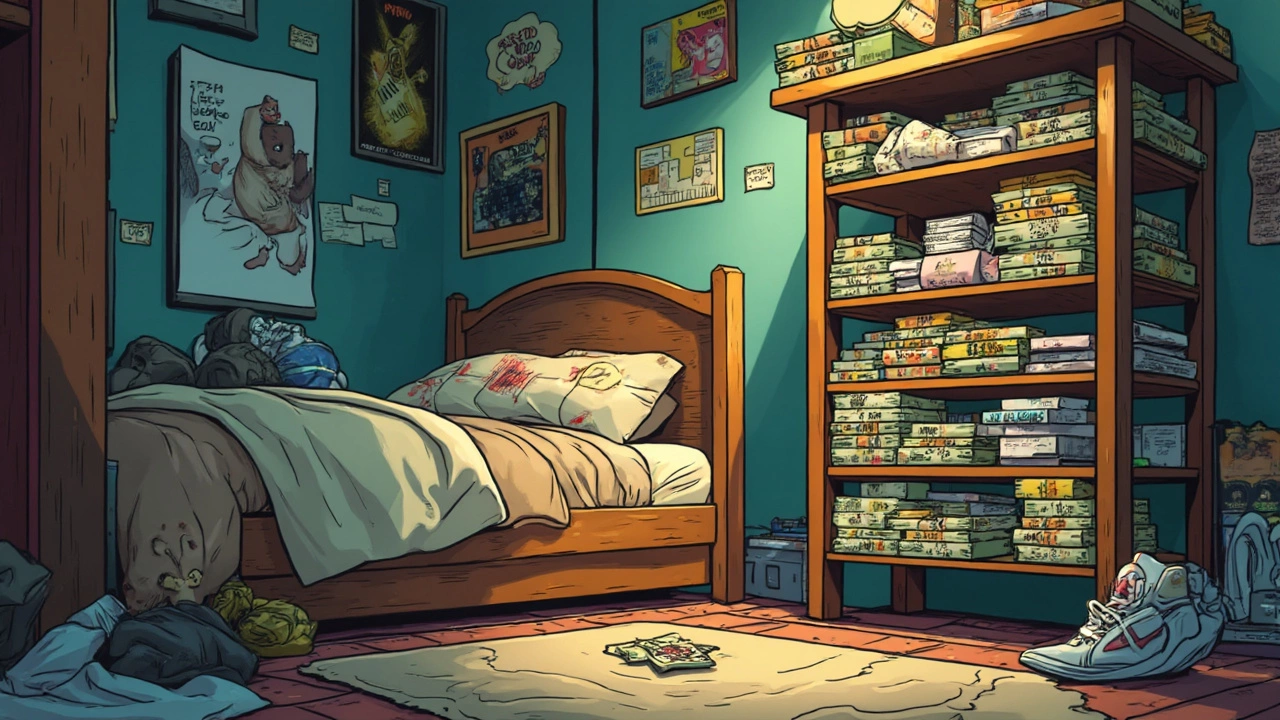Ever hear someone talk about making a 'rack' over the weekend and wonder what they’re talking about? If you’ve spent time around street culture, hip-hop, or even casual business chats, you’ve probably heard 'rack' thrown around as slang for $1000. Yep, just like that—one rack equals one thousand bucks, plain and simple.
This word pops up in places you wouldn’t expect, like when people talk about shelving or storage. In street slang, though, it has zero to do with assembling a bookcase or picking out kitchen shelves at Home Depot. The only thing stacking here is cash. And trust me, once you know the word, you’ll start spotting it everywhere—in songs, movies, and even at work.
If you want to avoid confusion (because grabbing a 'rack' at the hardware store means something totally different), it helps to know the lingo. Truth is, new money terms come and go fast, so staying in the loop can save you from some pretty awkward mix-ups. Let’s break it down so you never have to ask, 'Wait, did you mean money or wood?' ever again.
- Where Did ‘Rack’ Come From?
- Money Terms on the Streets
- Twists: ‘Rack’ in Shelving and Organization
- Using Money Slang in Real Life
Where Did ‘Rack’ Come From?
'Rack' as a way to say $1000 has been kicking around for a while, but most people trace it back to street culture and hip-hop in the early 2000s. The reason? The way cash literally stacks up. Picture $1000 in $100 bills—ten bills in a neat banded pile. That pile looks like a little rack, just like the word for a shelf that holds stuff. The connection stuck, and the word took off among anyone talking about large amounts of cash, not just musicians or hustlers on the street.
Rap songs helped launch 'rack' into everyday vocabulary. Around 2010, tracks like "Racks" by YC and Future made it mainstream. You started hearing 'rack' everywhere—not just in music but in TV, movies, memes, even regular conversations about cash. Once it hit the airwaves, it was game over—everyone wanted to sound hip and in-the-know about street slang.
If you’re wondering if it’s just an American thing, it mostly is. The United States set the trend here. In other places, people might use different slang for $1000—like 'grand' in the UK—but 'rack' definitely has that Stateside flavor.
Here’s a quick breakdown of how ‘rack’ compares to a few other money slang terms you’ll hear in the US:
| Slang Term | Amount | Typical Origin |
|---|---|---|
| Rack | $1000 | Hip-hop, street culture |
| Stack | $1000 (sometimes more) | Street culture, banking |
| Band | $1000 (in $100 bills) | Banks, street slang |
| Grand | $1000 | Older American/UK slang |
If you’re around anyone who talks about cash—or you just want to sound like you know what you’re talking about—‘rack’ is the word you’ll want to remember. It’s quick, catchy, and you’ll fit right in at any conversation where money is the topic.
Money Terms on the Streets
If you listen closely, street slang for money sounds almost like a code. Let’s dig into the words that pop up most, so you’re not left scratching your head during a conversation. The big one we’re talking about is street slang for $1000—'rack.' When someone says, “I made ten racks,” they mean $10,000. Simple math, but if you don’t know the term, it sounds like they’re talking about storage units.
‘Stack’ is another word you'll hear for $1000, although some people use it to mean $100, depending on their circle. Usually, if someone says, “He dropped a stack,” they probably dropped a grand, but you can always ask if you’re not sure—it’s better than nodding along and getting the details wrong.
There are a few more: ‘Band’ is street talk for $1000, taken from the rubber band used to hold a bundle of $100 bills together. Ever see a rapper waving around cash tied up with a band? That’s where it comes from. In Los Angeles, you might even hear 'G' for a thousand—short for 'grand.' 'K' (as in “5K”) is another shorthand you’ll spot, especially in text or online chats.
Here’s a quick list so you’ve got the basics down:
- 'Rack' = $1,000
- 'Band' = $1,000
- 'Stack' = $1,000 (but sometimes $100)
- 'G' = $1,000
- 'K' = $1,000 (commonly used in writing)
These terms aren’t just in music—they show up in everyday talk, movies, and on social media. If you want to keep up (or avoid confusion at the bank), these are the words to remember. And if someone ever tells you they spent 'two racks' on shelves, double-check if they mean storage or a stack of cash.

Twists: ‘Rack’ in Shelving and Organization
Here’s where it gets a little funny—outside of street slang, the word 'rack' actually means exactly what it sounds like: something you use for shelving or organizing things. You’ll see it everywhere, from garage sales to big box stores. Need to whip your garage into shape? You're probably shopping for tire racks or tool racks, not $1000 bills.
Companies in the storage world love talking about racks. They're sturdy, practical, and built to hold up heavy stuff—think pantry shelves, warehouse pallet racks, or even wine racks at fancy restaurants. The Home Depot website even features a "Rack Buying Guide" to help people pick out the perfect shelving. These storage racks aren’t just about keeping things off the floor; they’re crucial for maximizing space and keeping everything in reach.
"Proper shelving and rack systems boost efficiency and help businesses organize inventory in a way that saves both time and money,” says Chris Cramer, a logistics expert at Material Handling & Logistics magazine.
Pay attention, because this double-duty word can trip you up. If a conversation starts with 'I need a new rack,' context is everything. Are they talking about upgrading a storage system or looking to score street slang for $1000? Here's a quick tip: in DIY or organization chats, racks mean shelves. In music or cash talk, it’s all about the money.
- At hardware stores, 'rack' = shelving unit
- In casual conversation (especially if numbers get mentioned), 'rack' = $1000
- You’ll never see $1000 bills literally stacked on a Home Depot rack—unless someone is showing off for TikTok
So next time you see 'rack' in an ad for garage organization, you’ll know exactly what’s up. Context isn’t just helpful—it’s everything.
Using Money Slang in Real Life
So how does someone actually use street slang for $1000 out in the wild? Whether you’re talking to friends, handling a Craigslist deal, or keeping up with your favorite rap lyrics, knowing the right words makes you sound in-the-know. The most common way you’ll hear it? "I made a rack last week." It’s shorthand, quick, and gets the job done.
But it’s not just about sounding cool. Using street slang like 'rack' in money talk helps people keep messages fast and private—sometimes even confusing outsiders on purpose. For instance, at auto meets or sneaker exchanges, people talk about "two racks" for a rare pair without missing a beat. Even some small business owners swap money slang in private deals, just to keep the conversation short and subtle.
Here are a few ways you’ll hear ‘rack’ and other money slang used in the real world:
- “The new iPhone? That’s a whole rack!” — Meaning $1000.
- “He spent five racks on his new sound system.” — So, $5000. Simple math, right?
- “Can you front me half a rack till Friday?” — Someone’s asking for $500, half of $1000.
If you’re around these chats, context matters. Not everyone means cash—sometimes when people in retail talk about a rack, they mean, well, an actual rack. When you’re unsure, ask questions that clarify without making you look out-of-touch: "Wait, do you mean $1000 or something else?" Easy as that.
Money slang goes way beyond just 'rack,' though. Here’s a quick table with a few more common cash nicknames you’ll probably run into:
| Slang | Amount | Where You’ll Hear It |
|---|---|---|
| Rack | $1,000 | Everyday convo, music, big purchases |
| Stack | $1,000 (sometimes a pile of bills) | Rap, hustle talk, casual |
| Band | $1,000 (comes from $1,000 in a bank strap) | Hip-hop, young adults |
| G | $1,000 | Street slang, movies, TV |
| Grand | $1,000 | Old-school, business, family chats |
If you ever end up at a flea market or local event, you’ll notice these words make deals move smoother. No long explanations, no big scene. Just straight-up numbers with street flair. If you’re buying or selling, knowing the lingo helps you blend in and maybe even score a better deal, since it shows you’re not clueless about what people are talking about.
Still feeling nervous about using money slang? Practice with friends or watch a few YouTube videos featuring real conversations. After a while, you’ll know when to use 'rack,' 'band,' or just plain old 'grand' without tripping up. And if you mess it up? No big deal. Most people appreciate the effort and will clue you in if you get confused.

